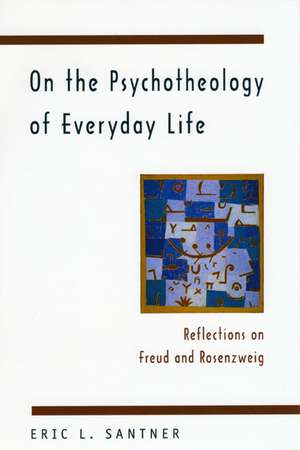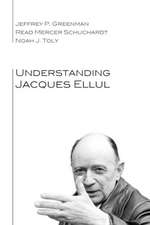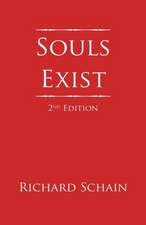On the Psychotheology of Everyday Life: Reflections on Freud and Rosenzweig
Autor Professor Eric L. Santneren Limba Engleză Paperback – 7 mai 2001
In On the Psychotheology of Everyday Life, Eric Santner puts Sigmund Freud in dialogue with his contemporary Franz Rosenzweig in the service of reimagining ethical and political life. By exploring the theological dimensions of Freud's writings and revealing unexpected psychoanalytic implications in the religious philosophy of Rosenzweig's masterwork, The Star of Redemption, Santner makes an original argument for understanding religions of revelation in therapeutic terms, and offers a penetrating look at how this understanding suggests fruitful ways of reconceiving political community.
Santner's crucial innovation in this new study is to bring the theological notion of revelation into a broadly psychoanalytic field, where it can be understood as a force that opens the self to everyday life and encourages accountability within the larger world. Revelation itself becomes redefined as an openness toward what is singular, enigmatic, even uncanny about the Other, whether neighbor or stranger, thereby linking a theory of drives and desire to a critical account of sociality. Santner illuminates what it means to be genuinely open to another human being or culture and to share and take responsibility for one's implication in the dilemmas of difference.
By bringing Freud and Rosenzweig together, Santner not only clarifies in new and surprising ways the profound connections between psychoanalysis and the Judeo-Christian tradition, he makes the resources of both available to contemporary efforts to rethink concepts of community and cross-cultural communication.
Santner's crucial innovation in this new study is to bring the theological notion of revelation into a broadly psychoanalytic field, where it can be understood as a force that opens the self to everyday life and encourages accountability within the larger world. Revelation itself becomes redefined as an openness toward what is singular, enigmatic, even uncanny about the Other, whether neighbor or stranger, thereby linking a theory of drives and desire to a critical account of sociality. Santner illuminates what it means to be genuinely open to another human being or culture and to share and take responsibility for one's implication in the dilemmas of difference.
By bringing Freud and Rosenzweig together, Santner not only clarifies in new and surprising ways the profound connections between psychoanalysis and the Judeo-Christian tradition, he makes the resources of both available to contemporary efforts to rethink concepts of community and cross-cultural communication.
Preț: 215.86 lei
Nou
Puncte Express: 324
Preț estimativ în valută:
41.31€ • 43.23$ • 34.38£
41.31€ • 43.23$ • 34.38£
Carte tipărită la comandă
Livrare economică 31 martie-14 aprilie
Preluare comenzi: 021 569.72.76
Specificații
ISBN-13: 9780226734880
ISBN-10: 0226734889
Pagini: 168
Dimensiuni: 140 x 216 x 18 mm
Greutate: 0.22 kg
Ediția:1
Editura: University of Chicago Press
Colecția University of Chicago Press
ISBN-10: 0226734889
Pagini: 168
Dimensiuni: 140 x 216 x 18 mm
Greutate: 0.22 kg
Ediția:1
Editura: University of Chicago Press
Colecția University of Chicago Press
Notă biografică
Eric L. Santner is the Philip and Ida Romberg Professor in Modern Germanic Studies, professor of Germanic studies, and a member of the Center for Jewish Studies at the University of Chicago. He is the author of several books, most recently On Creaturely Life: Rilke, Benjamin, Sebald, also published by the University of Chicago Press.
Cuprins
Acknowledgments
Introduction
1. In the Midst of Life
2. From the Reign of the Undead to the Blessings of More Life
3. Toward an Ethics of Singularity
4. Responsibility beyond the Superego
Epilogue: What Remains
Index
Introduction
1. In the Midst of Life
2. From the Reign of the Undead to the Blessings of More Life
3. Toward an Ethics of Singularity
4. Responsibility beyond the Superego
Epilogue: What Remains
Index














